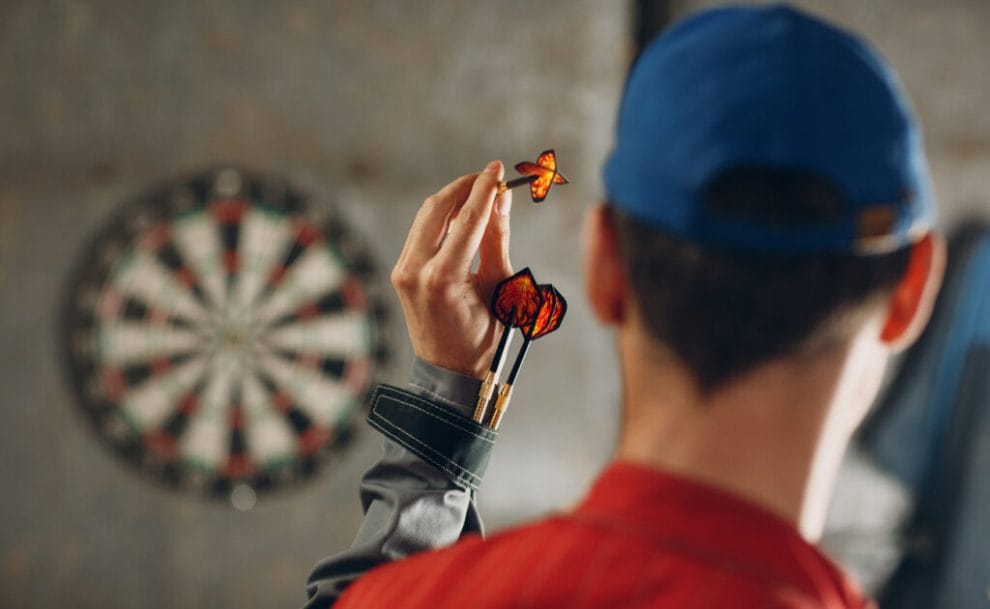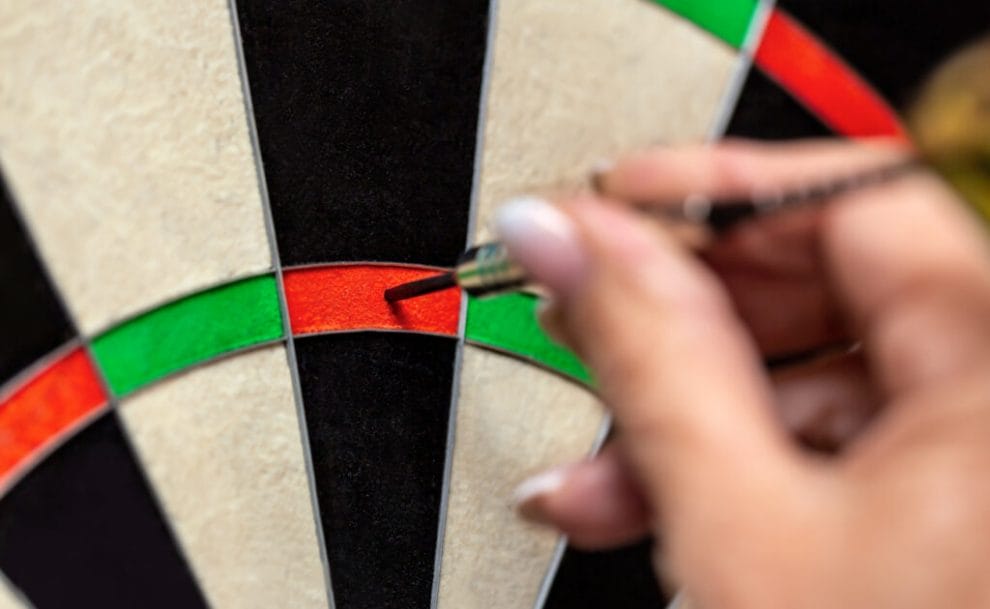
Darts started out as a simple English pub game, but has grown into a popular sport played globally, with live broadcasts of major tournaments played on most weekends, providing enthusiasts with plenty of options for betting. Whether you’re a darts aficionado or an online sports betting enthusiast, find out more about the history of this exciting sport.
Early weapons that started it all

Most darts historians agree that darts were adapted through the ages from weapons used in war, or for hunting. In other words, the grand daddy of today’s modern dart was the javelin, and assorted arrows and crossbow bolts. Comparisons are often drawn between archery targets and the modern dartboard.
The earliest darts, manufactured mainly in France, were made of solid wood to which a bit of lead was attached for weight, then finished off with split turkey feathers. While metal barrels of brass were patented in 1906, wooden shafts remained a popular choice until the 1970s, when plastic replaced both wood and metal.
It’s believed that the concentric rings of both the modern dartboard and archery target were probably drawn from much earlier targets which would have been cut from a tree trunk.
In the years before the First World War, UK dartboards were typically made of solid blocks of elm, but the wood needed to be soaked regularly to keep it soft, otherwise the darts would pock the surface and open holes in the board. In 1935, a chemist (Ted Leggatt) and pub owner (Frank Dabbs) had put their heads together to come up with a solution. When bundles of sisal fibres from the century plant – a type of agave – are packed together and compacted into a disk secured by a metal ring, landing darts do almost no damage, because they simply part the packed fibres instead of splitting wood. The use of sisal dartboards took over from solid wood and are still commonly in use today.
Origins of the darts point system
Brian Gamlin, a carpenter from Lancashire in northwest England, was responsible for the standard numbered point system, which he set out in 1896 to penalize inaccuracy. Since then, other configurations have found their way into the game, usually depending on where darts are played. For example, the Yorkshire and Manchester Log End boards have doubles and the bullseye, but do not have triples. The London Fives board has only 12 equal segments, with the doubles and trebles a quarter of an inch wide, unlike the standard board, which has 20 numbered segments. Darts betting enthusiasts may be interested to know that a handful of math papers have been published that deal with the theory behind what’s considered the optimal dartboard.
Chance versus skill
The debate about whether darts was a game of chance (which would make it illegal to bet on in pubs,) or a game of skill (in which case it would be perfectly legal to place sports bets on it) raged on for almost a century, with the activity being banned in several locations across the UK.
Then in 1908, a group of magistrates in the northern English town of Leeds set a precedent that would pave the way for the modern game and open the way for the eventual phenomenal popularity of virtual darts betting. The case of Adelphi Public House vs. the Crown involved Jim Garside, the pub’s owner, who was accused of allowing a game of chance (darts) to be played at his establishment. In his defense, Garside took along his best darts player, William Annakin, and challenged the magistrates to beat Annakin in a showdown in court. Annakin threw three darts in the 20 section of the board, but none of the magistrates came close to meeting his skill. The case was dismissed.
Darts in the early 20th century
The popularity of darts spiked after the First World War, when the first competitive brewery leagues were formed. By 1924, English players saw the need for a set of formal rules, so the following year, the National Darts Association (NDA) was set up to oversee the game. Two years later in 1927, the first ever “News of the World Individual Darts Championship” took place in London, drawing 1,010 contestants from the immediate metropolitan area. By the 1938/39 season, the competition had more than 280,000 entrants, and darts had clearly become one of the most popular recreational activities in England at the time.
While competitions were put on hold during the Second World War, a team of famous English darts champions kept the game alive by being willing to play any member of the public for a fee. By the end of the war, they had managed to raise both the profile of the game and people’s morale at home and overseas, and in the process raised £202,681 ($280,000 at the time, or worth $5.4 million by today’s standards) for the Red Cross Society.
After the war, the game continued as a popular recreational activity for individuals, while competitions held by the News of the World kept the rules originally set out by the (now defunct) NDA alive until the 1970s, when the British Darts Organisation (BDO) was established.
Darts later in the 20th century

To increase the popularity of darts worldwide, representatives drawn from 14 nations set up the World Darts Federation (WDF) in 1976. Three years later, the number of Brits playing competitively at least three times a week was believed to be around two million, with another two million playing recreationally on a regular basis. Country membership of the WDF had swelled to 49 nations and today 60 countries are part of the organization (the BDO is also a member of the WDF.)
In 1992, a group of professional players in search of bigger prize money and more exposure, left the BDO and established the Professional Darts Corporation (PDC).
Now both organizations hold televised world professional championships over year-end and New Year, and these events generate some of the most highly anticipated sports betting odds in the world.
In September 2020, the BDO went into liquidation. This followed irregularities at the 2019 World Masters, which saw the organization demoted to associate member status by the WDF and subsequent financial woes.
Along with overseeing county, team and individual events in the UK, the BDO holds the World Masters and a series of Open tournaments. The PDC, meanwhile, is in charge of the World Championship and Premier League, as well as the UK Open, World Matchplay, World Grand Prix, and the Grand Slam of Darts.
Bet on darts with Borgata Online’s virtual sports
The rise of darts since the 1970s has been nothing short of a global sports phenomenon, and it’s showing no signs of letting up on the excitement or the game’s rise in popularity. At Borgata Online, we offer many sports betting lines and other bets for you to explore. Our best online sportsbook allows you to wager on darts, as well as a variety of leagues across many sports. No matter what your gambling tastes may be, you can find something to enjoy when you register at Borgata Online.